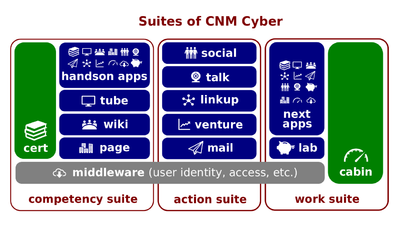Difference between revisions of "Microservices at Cloud"
MariamKhalid (talk | contribs) (→Closing) |
MariamKhalid (talk | contribs) (→Closing) |
||
| Line 20: | Line 20: | ||
===Closing=== | ===Closing=== | ||
| + | Select True/False: | ||
| + | :*[[Jitsi]] is one of the [[commercial off-the-shelf]] and [[open source]] [[software solution]] that [[CNM Cloud]] utilizes. (True/False) | ||
Revision as of 19:14, 20 October 2020
Microservices at Cloud (hereinafter, the Lectio) is the lesson part of the Soft behind CNM Cloud lesson that introduces its participants to CNM Cloud. This lesson belongs to the Introduction to CNM Cloud session of the CNM Cyber Orientation.
Content
The predecessor lectio is Engines and Organizers.
Script
- The concept of microservice architecture or, simply, microservices, looks like similar to the service-oriented architecture (SOA) one. However, there are many differences, from which just two are mentioned here:
- First of all, the scopes vary. Microservices can be useful to design one software application. Vice versa, SOA is used to organize all the end-user applications of CNM Cloud.
- Secondly, microservices lack the middleware layer that unifies all the software systems. They rely on lightweight unorganized communication messages instead.
- The CNM Cyber Team adopts commercial off-the-shelf (COTS) software solutions as they are. Some of them, like Jitsi, may deploy microservices.
- CNM Cabin and WorldOpp Middleware are the only custom-written software solutions of CNM Cloud. Today, they use the layered architecture, which is also known as monolith. Nevertheless, the Team plans to re-build these solutions adopting microservices.
Key terms
Closing
Select True/False:
- Jitsi is one of the commercial off-the-shelf and open source software solution that CNM Cloud utilizes. (True/False)
What CNM Farms Are is the successor lectio.
